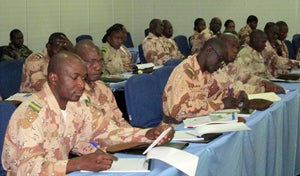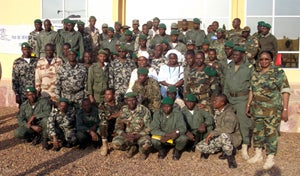Malian armed and security forces gear up to better protect women and children in conflict situations
Date:
“I didn’t know that a soldier could or should play a role in protecting and helping the civilian population, especially women and children, who are the most vulnerable and exposed in conflicts,” said a Sergeant in the Mopti area in northern Mali.
He was one of the first 365 soldiers to have taken part in a capacity-building programme for defence and security forces. Covering issues such as the protection of women and children and international humanitarian law, the Ministry of Defence is running the training programme in partnership with UN Women, four other United Nations agencies and the Government of the Netherlands.

Back on duty after his training, the Sergeant said, “For me the relevant modules were violence against women and girls. In my capacity as a soldier, I could never imagine that a man would be able to rape a girl on his own or collectively, let alone rape a child. … I’ve learnt a lot, especially about International Humanitarian Law.”
The programme aims to train 4,000 members of the defence and security forces and raise awareness of at least 20,000 armed forces personnel around essential notions concerning the protection of women and children, and international humanitarian law.
The topics covered in the training include: military conduct and civilian-military relations; gender issues and international resolutions on women, peace and security; international Humanitarian Law and the protection of civilian populations, especially women and children; gender-based violence, especially sexual violence in conflict situations and HIV/AIDS and STDs in conflict situations.
Members of all ranks of the armed forces have signed up to the programme. Women’s rights and gender issues are emerging as a necessity following the renewed occupation of northern regions on 9 January 2013. As of January 2013, the training had commenced with the Republican Guard, the Air Force, the Army, the Police and Military Engineers.
In the words of Commander Aminata Diabaté, Gender Focal Point within the Humanitarian Law Section, “The level of knowledge that trainees were able to assimilate was more than satisfactory. Personnel who have been deployed are currently in Sévaré Markala, Gao and Douentza. We are in contact with them; and on the basis of information we received … they are behaving more humanely, are putting their learning into practice and passing it on to those who have not had the benefit of these sessions.”

To avoid atrocities and other unethical behaviours, the general staff is overseeing the training of troops prior to their deployment in the field.
Contacted by telephone, one of the soldiers in the Gao region who has received the training reiterated its benefits: “The training was very helpful to us. As I speak to you, we have rescued nine child soldiers who had been enlisted by jihadists who are with us in observance of the rights of children under different conventions (…) We are committed to respecting all the rules of international humanitarian law and having them respected by others. And that is something we are proud of today.”
For his part, Chief of Staff of the Air Force Colonel-Major Solomane Bamba notes that , “When Mali and its allies are trying to restore its territorial integrity, issues of international humanitarian law remain important, as do the protection of women and children in current armed conflicts.”
This programme is part of UN Women’s humanitarian mandate, which aims to strengthen armed forces and peace-keeping missions in the prevention of sexual and gender-based violence as well as human rights and women’s rights in conflict situations.
UN Women’s office in Mali has mobilized four agencies of the United Nations around this initiative, namely UNICEF, UNFPA, UNAIDS and UNHCR. Training will continue throughout the first quarter of 2013 and will be intensified in locations where service personnel are already on the ground.